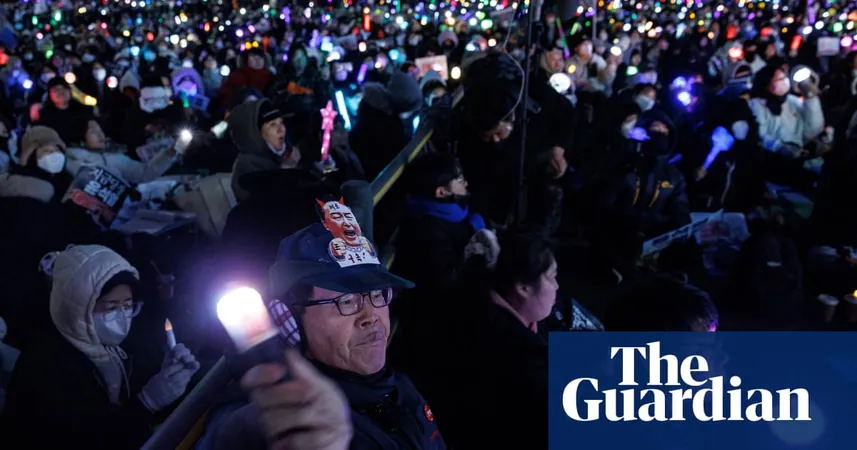
Political Unrest Erupts in Seoul as Protests Escalate After Impeached President Yoon Suk Yeol Escapes Arrest
2025-01-04
Author: William
Political Unrest in Seoul
Seoul is currently a hotbed of political turmoil as thousands of demonstrators took to the streets following a dramatic attempt to arrest the suspended president, Yoon Suk Yeol. This upheaval comes on the heels of a controversial martial law decree that has led to his impeachment and ignited widespread dissent among the populace.
Legal Challenges for President Yoon
Yoon has been effectively holed up within the confines of the presidential residence, guarded by a loyal security detail, as he faces serious criminal charges including insurrection—one of the few crimes that doesn't grant him presidential immunity. If formal charges are brought forth, Yoon could make history as the first sitting South Korean president to be arrested, potentially facing severe penalties, including the death sentence.
Divided Public Sentiment
The protests saw a fierce division of opinions, as supporters of Yoon gathered to defend him against what they perceive as political persecution. "Arresting President Yoon could jeopardize our national security and our alliances with the US and Japan," claimed Kim Chul-hong, a staunch supporter. This sentiment echoes the fears among many that instability could embolden North Korea amid rising tensions in the region.
Anti-Yoon factions also mobilized in large numbers, demanding accountability and justice. Members of the Korean Confederation of Trade Unions attempted to march on Yoon’s residence but were met with a heavy police blockade, resulting in clashes that led to injuries and arrests. The depth of division within South Korean society is palpable as protesters shout for either the president's arrest or to declare his impeachment null and void.
Investigations and Standoffs
Yoon's legal troubles escalated further as investigators sought the cooperation of the acting president, Finance Minister Choi Sang-mok. Meanwhile, two top officials from Yoon's presidential security brigade declined police requests for questioning, citing the extreme sensitivity of their roles in protecting the suspended president.
In a tense standoff last Friday, military and security personnel physically shielded Yoon from law enforcement attempts, resulting in investigators being forced to retreat due to safety concerns. This intense showdown involved pushing but no reported shots fired, and the warrant for Yoon's arrest teeters on the brink of expiration, adding to the precarious legal situation.
Impeachment Trial Timeline
The timeline for Yoon's impeachment trial is set for January 14, if he chooses not to appear, increasing the possibility that legal proceedings could unfold without his participation. Historical precedents show that former presidents Roh Moo-hyun and Park Geun-hye did not physically attend their impeachment trials, placing Yoon in a similar position of vulnerability.
Expert Opinions
Legal experts opine that waiting for a more solid legal framework to arise may be the tactic of choice for investigators before making another move to detain the embattled president. Chae Jin-won of Humanitas College at Kyung Hee University remarked on the complexities involved, stating that executing an arrest before the constitutional court resolves the impeachment could prove challenging.
International Concerns
As Yoon stands firm, declaring his commitment to fight for his political survival "to the very end," international eyes remain keenly focused on South Korea. The US, a pivotal ally, urged its political leaders to seek stability amidst chaos. Incoming discussions from US Secretary of State Antony Blinken emphasize concerns not just about the internal strife but also about relations with a nuclear-capable North Korea, an ever-looming threat in the backdrop of South Korean politics.
Conclusion
Stay tuned as this situation develops—could we witness history in the making with the arrest of a sitting South Korean president?



 Brasil (PT)
Brasil (PT)
 Canada (EN)
Canada (EN)
 Chile (ES)
Chile (ES)
 Česko (CS)
Česko (CS)
 대한민국 (KO)
대한민국 (KO)
 España (ES)
España (ES)
 France (FR)
France (FR)
 Hong Kong (EN)
Hong Kong (EN)
 Italia (IT)
Italia (IT)
 日本 (JA)
日本 (JA)
 Magyarország (HU)
Magyarország (HU)
 Norge (NO)
Norge (NO)
 Polska (PL)
Polska (PL)
 Schweiz (DE)
Schweiz (DE)
 Singapore (EN)
Singapore (EN)
 Sverige (SV)
Sverige (SV)
 Suomi (FI)
Suomi (FI)
 Türkiye (TR)
Türkiye (TR)
 الإمارات العربية المتحدة (AR)
الإمارات العربية المتحدة (AR)